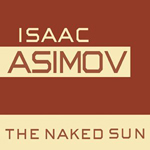
 The Naked Sun (Robots #2)
The Naked Sun (Robots #2)
By Isaac Asimov; Read by William Dufris
Publisher: Random House Audio
Publication Date: July 2014
[UNABRIDGED] – 7 hours, 41 minutes
Themes: / robots / colonization / science fiction / detective /
Publisher summary:
A millennium into the future, two advancements have altered the course of human history: the colonization of the Galaxy and the creation of the positronic brain. On the beautiful Outer World planet of Solaria, a handful of human colonists lead a hermit-like existence, their every need attended to by their faithful robot servants. To this strange and provocative planet comes Detective Elijah Baley, sent from the streets of New York with his positronic partner, the robot R. Daneel Olivaw, to solve an incredible murder that has rocked Solaria to its foundations. The victim had been so reclusive that he appeared to his associates only through holographic projection. Yet someone had gotten close enough to bludgeon him to death while robots looked on.
What a shocker! I suspected the murderer but not the ending Asimov gave us. Wow.
The Naked Sun gives us a look at the mysterious Outer Worlds, first mentioned in The Caves of Steel. Solaria has never had a crime, due to their extremely privileged population served solely by robots who, of course, never commit crimes of passion. Lige Bailey finds this open, practically empty environment poses both the challenges of solving the mystery and of adapting his agoraphobic nature, thanks to a lifetime of living in underground cities on overpopulated Earth.
Asimov has fun looking at the sociological effects of a high-tech, low population world. I was fascinated by Asimov’s contrast of Elijah Bailey, used only to an overcrowded Earth, with the outworld Solarian society which had open space, eugenics, and many robots. There is no way Asimov could have foreseen our computer-oriented society today, but I found the Solarian society’s preference for “viewing” through screens rather than “seeing” in person to be a disturbing echo of what we ourselves seem to be moving toward.
I originally read this long ago and remembered a lot about the Solarian society but almost nothing about the mystery itself. Listening to William Dufris’ excellent narration, so long after my first reading, I found this a wonderful mystery. Dufris surpassed his performance in The Caves of Steel as he voiced a wide range of Solarian characters from sensuous to prim, blowhard to reserved, blustering to withdrawn. My favorite voices actually were the Solarian robots which were precisely what you’d expect, and which we hadn’t heard yet though several robots spoke in The Caves of Steel.
If you haven’t revisited this series lately I recommend it highly, especially this audio version which brings it to life in a fresh way.




 Caves of Steel (Robots #1)
Caves of Steel (Robots #1)
